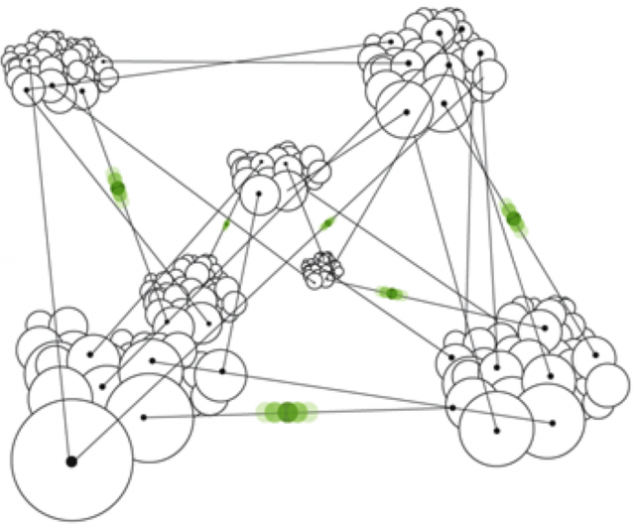553
3 psychological theories— how to better understand people
Knowledge of the psychological characteristics of people helps to communicate in any field, a better understanding of how loved ones and casual acquaintances, colleagues and clients. Here are three interesting psychological theory, with which you will be able to better interact with people, to understand themselves and others.

Number Danbarnesdavies Robin Dunbar linked the activity of the neocortex, the main part of the cerebral cortex of the brain, with the level of social activity. He examined the size of social groups in different animals and the number of partners involved in grooming (an important part of courtship in animals, for example, shuffling wool in primates). It turned out that the size of the neocortex is directly linked to the size of the social group and the number of individuals who care for each other (constantly communicate in human terms). When Dunbar began to study humans, he found that social group has about 150 people. That is, a person has about 150 people whom he can ask for help or give something to them.

The closer a group is 12 people, but 150 social connections is a more significant figure. This is the maximum number of people with whom we have social connections. If you have friends over this number, some from past relationships go away and you cease communication with them. To put it differently, we get the following picture: This is the number of people with whom you will not refuse to drink in a bar if I happened to meet them there.Writer Rick Lux tried to challenge the theory of Dunbar, and in his work wrote about trying to do this: "Trying to challenge the theory of Dunbar, I actually confirmed it. Even if you decide to disprove Dunbar's number and try to expand your circle of acquaintances, you will be able to communicate with a large number of people, but that a large number of times and there are 200 people or less". This experiment allowed Laxou to pay attention to closer ties: After my experiment, I imbued with respect to: 1. British anthropology 2. My real friends. I realized that not so much, but now I treat them much better and appreciate them more. The number of Dunbar is especially useful for marketers and people working in the field of social media and branding. If you know that each person can only interact with 150 friends and acquaintances, it will be easier to react to failure. Instead of being angry and upset over a situation when people do not want to communicate with you and support your brand, think about the fact that they only have 150 contacts, and if they choose you, abandon one of his friends. On the other hand, if they make contact, you will be more appreciative that they chose you. As well as a social network, where many more thousands of friends? On the other hand, how many of them you somehow support communication? Certainly the number of such people is close to 150. And once you have new contacts, old forgotten and just "hang" you have in friends. A periodically "clean" your list and remove those who will not communicate, leaving only the close ones, and it's not quite right. The thing is the importance of not only strong ties, that is, your immediate surroundings. In the book Morten Hansen's "Collaboration" describes how important a person's weak ties (in particular, relationships that start via social networks, e.g., friends of friends, subscribers). Hansen writes that these relationships are the key to new opportunities. Research has shown that human development is important not so much the number of ties as their diversity: people who hold different perspectives, with different experiences and knowledge. And such a diverse contingent it is possible to find in the social network. Weak ties are useful because they lead us in an unfamiliar region, while strong ties exist in already studied areas.Shaver, Hallonet statement of Robert Hanlon, author of a collection of jokes from Pennsylvania, it reads: Never attribute to malice that which can be explained by stupidity.In Hanlon's razor instead of the word "stupidity" you can put "ignorance", that is, the lack of information before making a decision or any action. And here is how it works this razor: when you think that someone treats you with malice or does something "to spite", first dig deeper and find out whether it is connected with ignorance. For example, if you have received an e-mail from the employee in which he sharply speaks against your idea, maybe he just didn't understand its fact, and his indignation was not directed against you, only against the idea which seemed to him stupid or dangerous. In addition, it often happens that people try to help people with my methods, but he perceives it as evil machinations and harm. People are not by nature evil creatures, so that each of the alleged harm may be a desire to help, is simply absurd and ignorant. Factors of motivation Gerberlabeler theory can help in communicating at work with employees and colleagues, and maybe even with friends and spouses. This theory was put forward in 1959 by Frederick Herzberg and its essence lies in the fact that satisfaction and dissatisfaction from work are measured differently and are not two ends of one straight line. In theory, it is assumed that the dissatisfaction from work depends on the "hygiene factors" such as working conditions, salary, relationship with superiors and colleagues. If not, dissatisfaction is. But job satisfaction does not arise from the presence of the above factors and the following groups of reasons, "motivation": an engaging process of work, recognition and opportunities for growth.From this we can deduce the following: if you are working a paying job with comfortable working conditions, can still feel lousy, for example, if you have no responsibilities, and you will never feel success. And Vice versa — what you get recognition and understand that creating something valuable and worthwhile, it's not the fact that you get paid pennies, and working conditions could not be worse. This theory is particularly useful to those responsible for company personnel. Now you will understand why people, despite the good conditions, still quit my job. For those who are dissatisfied with the work, this theory will help to figure out why there is dissatisfaction, and how to fight it. And another thing: if your friends, relatives or acquaintances complaining about their jobs you would never say to them: "But you're out there so well paid! You with fat rage, stay." And this can be very important for their future. источник:psychology-age.ru
Source: /users/1077

Number Danbarnesdavies Robin Dunbar linked the activity of the neocortex, the main part of the cerebral cortex of the brain, with the level of social activity. He examined the size of social groups in different animals and the number of partners involved in grooming (an important part of courtship in animals, for example, shuffling wool in primates). It turned out that the size of the neocortex is directly linked to the size of the social group and the number of individuals who care for each other (constantly communicate in human terms). When Dunbar began to study humans, he found that social group has about 150 people. That is, a person has about 150 people whom he can ask for help or give something to them.

The closer a group is 12 people, but 150 social connections is a more significant figure. This is the maximum number of people with whom we have social connections. If you have friends over this number, some from past relationships go away and you cease communication with them. To put it differently, we get the following picture: This is the number of people with whom you will not refuse to drink in a bar if I happened to meet them there.Writer Rick Lux tried to challenge the theory of Dunbar, and in his work wrote about trying to do this: "Trying to challenge the theory of Dunbar, I actually confirmed it. Even if you decide to disprove Dunbar's number and try to expand your circle of acquaintances, you will be able to communicate with a large number of people, but that a large number of times and there are 200 people or less". This experiment allowed Laxou to pay attention to closer ties: After my experiment, I imbued with respect to: 1. British anthropology 2. My real friends. I realized that not so much, but now I treat them much better and appreciate them more. The number of Dunbar is especially useful for marketers and people working in the field of social media and branding. If you know that each person can only interact with 150 friends and acquaintances, it will be easier to react to failure. Instead of being angry and upset over a situation when people do not want to communicate with you and support your brand, think about the fact that they only have 150 contacts, and if they choose you, abandon one of his friends. On the other hand, if they make contact, you will be more appreciative that they chose you. As well as a social network, where many more thousands of friends? On the other hand, how many of them you somehow support communication? Certainly the number of such people is close to 150. And once you have new contacts, old forgotten and just "hang" you have in friends. A periodically "clean" your list and remove those who will not communicate, leaving only the close ones, and it's not quite right. The thing is the importance of not only strong ties, that is, your immediate surroundings. In the book Morten Hansen's "Collaboration" describes how important a person's weak ties (in particular, relationships that start via social networks, e.g., friends of friends, subscribers). Hansen writes that these relationships are the key to new opportunities. Research has shown that human development is important not so much the number of ties as their diversity: people who hold different perspectives, with different experiences and knowledge. And such a diverse contingent it is possible to find in the social network. Weak ties are useful because they lead us in an unfamiliar region, while strong ties exist in already studied areas.Shaver, Hallonet statement of Robert Hanlon, author of a collection of jokes from Pennsylvania, it reads: Never attribute to malice that which can be explained by stupidity.In Hanlon's razor instead of the word "stupidity" you can put "ignorance", that is, the lack of information before making a decision or any action. And here is how it works this razor: when you think that someone treats you with malice or does something "to spite", first dig deeper and find out whether it is connected with ignorance. For example, if you have received an e-mail from the employee in which he sharply speaks against your idea, maybe he just didn't understand its fact, and his indignation was not directed against you, only against the idea which seemed to him stupid or dangerous. In addition, it often happens that people try to help people with my methods, but he perceives it as evil machinations and harm. People are not by nature evil creatures, so that each of the alleged harm may be a desire to help, is simply absurd and ignorant. Factors of motivation Gerberlabeler theory can help in communicating at work with employees and colleagues, and maybe even with friends and spouses. This theory was put forward in 1959 by Frederick Herzberg and its essence lies in the fact that satisfaction and dissatisfaction from work are measured differently and are not two ends of one straight line. In theory, it is assumed that the dissatisfaction from work depends on the "hygiene factors" such as working conditions, salary, relationship with superiors and colleagues. If not, dissatisfaction is. But job satisfaction does not arise from the presence of the above factors and the following groups of reasons, "motivation": an engaging process of work, recognition and opportunities for growth.From this we can deduce the following: if you are working a paying job with comfortable working conditions, can still feel lousy, for example, if you have no responsibilities, and you will never feel success. And Vice versa — what you get recognition and understand that creating something valuable and worthwhile, it's not the fact that you get paid pennies, and working conditions could not be worse. This theory is particularly useful to those responsible for company personnel. Now you will understand why people, despite the good conditions, still quit my job. For those who are dissatisfied with the work, this theory will help to figure out why there is dissatisfaction, and how to fight it. And another thing: if your friends, relatives or acquaintances complaining about their jobs you would never say to them: "But you're out there so well paid! You with fat rage, stay." And this can be very important for their future. источник:psychology-age.ru
Source: /users/1077























